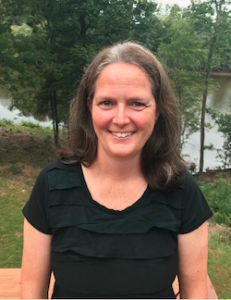Author:

Dr. Sarah Moore
Visiting Assistant Professor
As a play therapist, counselor, counselor educator and parent, I am concerned about the lasting psychological impact the current pandemic will have on children. While the pandemic certainly has been trying for adults, the impact on children has the potential to be even more devastating. As a parent of three who are at different developmental stages (a sophomore in college, fifth-grader and first-grader), it can be overwhelming to consider how to best support them.
I am aware of the potential negative consequences of limited contact with their peers, managing online education, and the fear associated with safety precautions and limited information. In hopes of limiting our children’s exposure to COVID-19, they are doing online learning, not eating out, not playing with others and mostly staying at home. When I venture out, I am struck by the surreal experience of being surrounded by people in masks (or not). This reminds me of the unprecedented times we are all experiencing. If this is strange or disconcerting to me as an adult, I can only imagine how children are viewing it.
Just as with any other crisis, when adults are trying to manage difficult situations, we sometimes forget that children are also experiencing it. When working with children who are facing a crisis or dramatic life change, it is important for caregivers to share information with them. If we don’t, they will create their own stories to explain what is going on. Often their stories are worse than reality.
Rather than leaving children in the dark to protect them, it is important to check in with them to make sure they are accurately interpreting what is going on around them and that we answer any questions they have. As we do this, we should always consider where the child is developmentally and make sure to share only what the child is able to understand and manage. If you need some support as a parent, consider finding a counselor for you and your child. Counseling students complete courses in human growth and development that prepare them to best serve children at all ages in their mental health needs.
There are many factors to balance as we work to keep our children mentally and physically healthy. While the American Academy of Pediatrics has stated that, “the safety and developmental well-being of our society’s children make in-person schooling (when it is safe to do so) a necessity,” that is clearly contingent on it being safe. Every child and family has different needs and circumstances, and therefore each situation should be evaluated differently. There is no right or wrong answer. Following the guidelines of the CDC that include handwashing, mask-wearing and physical distancing practices to ensure everyone’s safety is critical. However, we must also pay close attention to the mental health and well-being needs of children.
Be creative, keep to a routine and talk to your children. Oh, and get your flu shots! And if you want to be a part of the solution, consider completing your Master of Counseling online at Wake Forest University.
In the program, you learn basic counseling skills as well as play therapy and other counseling theories and techniques that support the mental health needs of children and adults. As you manage your busy life, particularly during a pandemic, the online program at Wake Forest University is flexible, allowing you to accomplish a career goal with as little disruption to your life as possible.
Below are some great resources to refer to for additional information on supporting your child through this trying time.
Sources:
Association of Play Therapy https://www.a4pt.org/
American Counseling Association https://www.counseling.org/
Association for Child and Adolescent Counseling http://acachild.org/
American Academy of Pediatrics https://aapca2.org/covid19/
Center for Disease Control and Prevention https://www.cdc.gov/coronavirus/2019-ncov/daily-life-coping/parental-resource-kit/index.html
